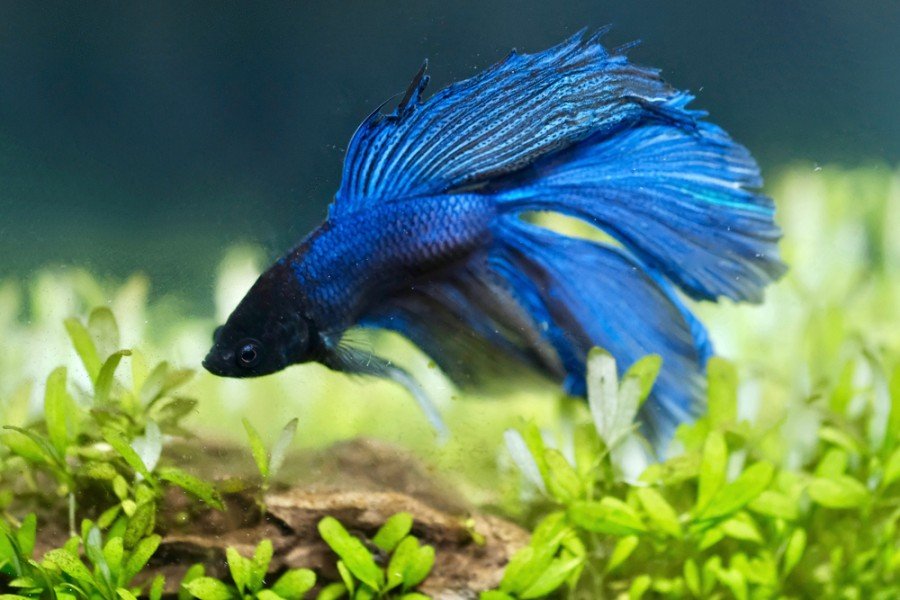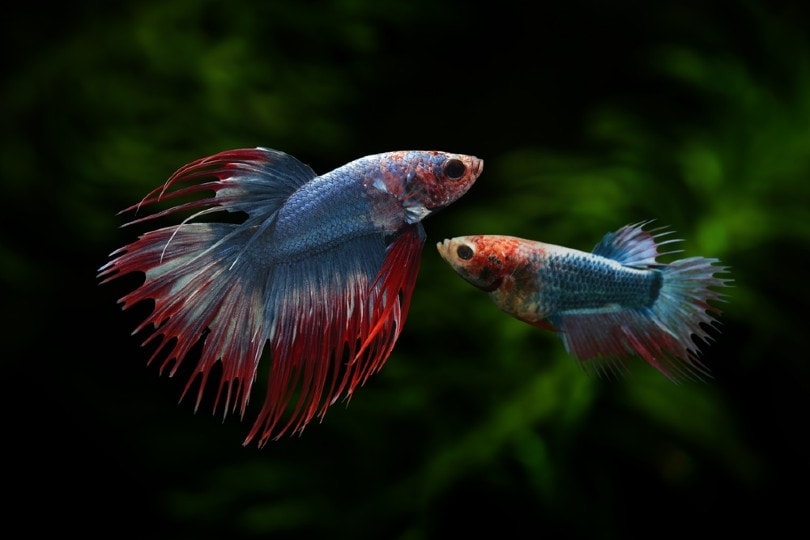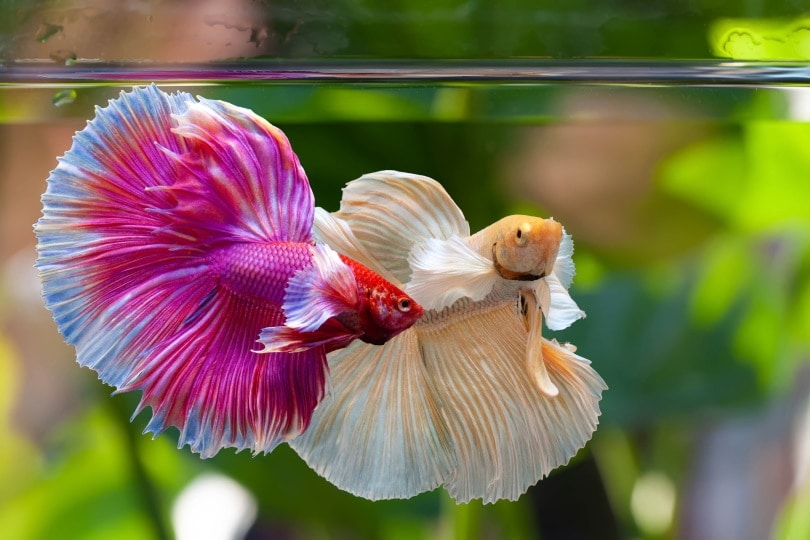Betta Fish Poop & Constipation: Vet-Approved Science & Info

Updated on
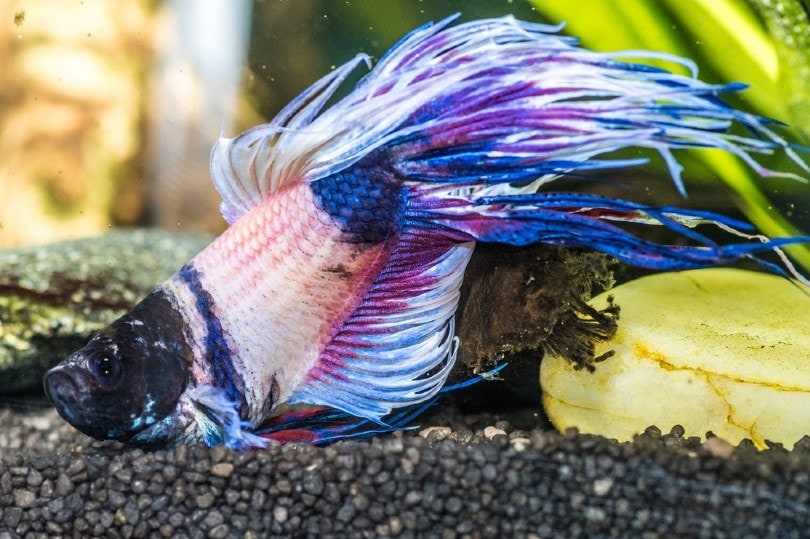
One of the parts of fish keeping that seems to be talked about least is discussing fish poop. It’s not a glamorous topic, so it’s understandable. However, digestive health is a necessary part of your fish’s overall health.
The digestive system plays a role in immunity and is responsible for removing waste from the body that the body can’t use. It’s important to ensure your Betta fish has healthy, normal poop to ensure it’s healthy. Knowing what to look for when it comes to your Betta fish’s poop will help you be a better fish keeper.
What Does Healthy Betta Fish Poop Look Like?
Your Betta fish’s poop should be rounded and almost pellet-like. It will usually be anywhere from tan to dark brown, although sometimes you’ll notice a reddish tint, which can be caused by the food your Betta fish has been eating. If you see this reddish coloration, don’t let it worry you unless it has suddenly appeared or seems to be bloody.
What Does Abnormal Betta Fish Poop Look Like?
Abnormal Betta fish poop will typically be long and stringy. It will often trail behind your Betta fish as it swims around. You may also see normal looking poop that your Betta fish seems to be having difficulty fully passing. It may not trail behind your fish, but it may seem to be sticking out of the fish’s vent, or the opening that poop comes out of, for a long time.
White or yellowish poop is frequently a sign that something is going on with your Betta fish. Sometimes, you’ll notice a white cast to your Betta fish’s poop, and this isn’t always completely abnormal. Normal, healthy fish poop is covered in a mucus coating. Typically, you won’t see this coating because the color of the digested food is darker than the mucus. If you are seeing a white cast in the stool, then it’s likely indicative of your Betta fish not having eaten recently.
Problems that Abnormal Poop Can Indicate
1. Parasites
Long, stringy, white poop in fish can indicate parasitic infections. It’s important to know, though, that Betta fish won’t suddenly develop a parasitic infection without an infectious source. This means that if your Betta fish has been living in the same tank by itself with no new tank mates or plants added recently, then it’s almost impossible for it to have developed a parasitic infection.
Internal parasites will cause loss of appetite, listlessness, and erratic swimming. You may also notice redness, irritation, and/or threadlike worms coming from your Betta’s tail area. If accompanied by bloating, these signs usually are indicative of a roundworm infection.
Parasites in poop may be alive and will visibly move once passed. The easiest way to tell if it’s actually moving or if the current in the tank is giving the illusion of movement is to remove the poop and put it into a clear cup or bowl that will allow you to see the poop without water movement. Take note that not all parasites move when in poop, some are passed as eggs.
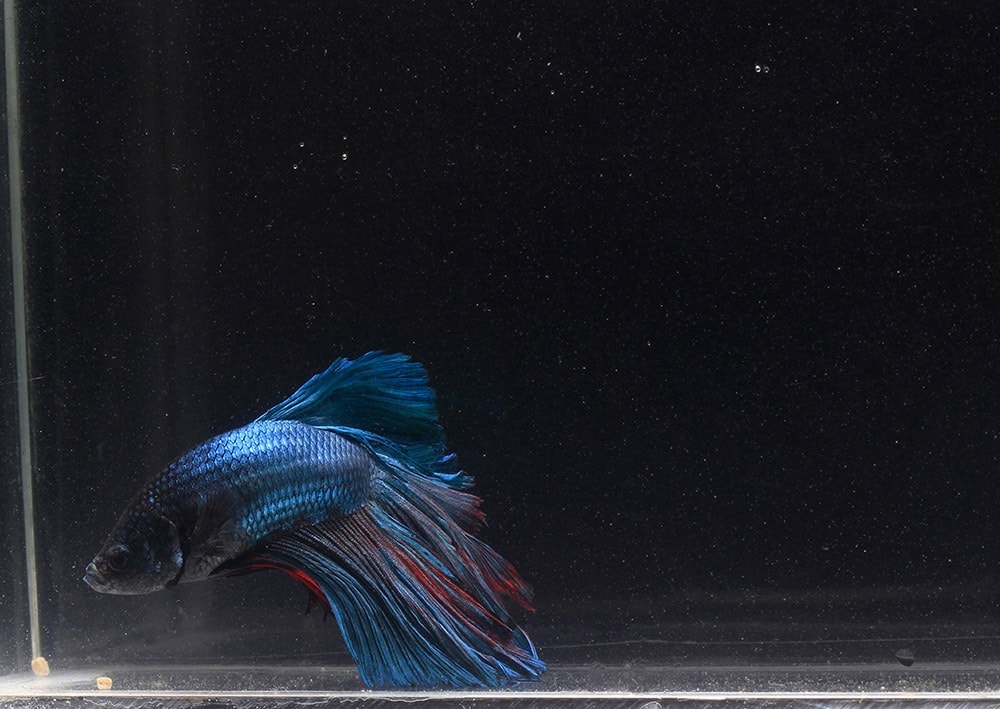
2. Other Infections
If your Betta fish has developed a fungal or bacterial infection, then it may have developed inappetence or anorexia. If this is the case, then your Betta fish will begin passing white mucus casts instead of solid stool. All this indicates is that your Betta hasn’t eaten, but it can also indicate to you that there is an underlying problem if you have been offering food to your Betta and it’s not eating the food you’re offering.
3. Overfeeding
We all love to offer our fish food and treats to show them how much we care. Unfortunately, overfeeding can have more negative effects in the tank than just fouling the water. Overfeeding your Betta can slow down digestion and make it more difficult to pass stool. If you’re seeing poop sticking out of your Betta’s vent for long periods without fully passing, then you may be overfeeding your fish.
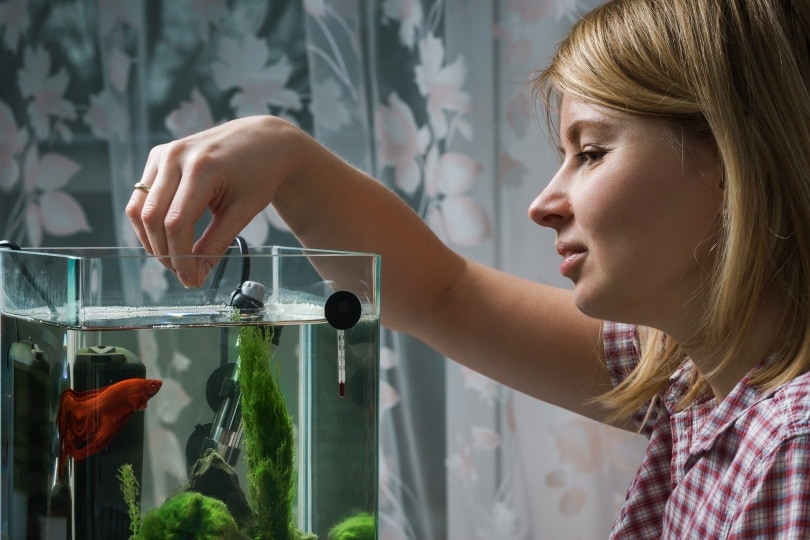
4. Other Non-Infectious Issues
Non-infectious causes such as enlarged internal organs or a tumor within your Betta’s body can also cause abnormal poop (or no poop). The severity of the changes in your Betta’s poop vary depending on the extent of the internal issue.
How Often Should a Betta Fish Poop?
A healthy fish that is eating well will poop multiple times per day. You may not always see this occur since they will poop at night and when you aren’t home. Since you can’t always see poop on the substrate, it’s a good idea to closely watch your Betta for any other signs of illness if you haven’t seen it poop recently. Lethargy, inappetence, fin clamping, and rapid gill movement can all indicate underlying medical conditions.
How to Know if Your Betta Fish is Constipated
Betta fish don’t truly get constipated, but their digestive tract can be slowed down for various reasons. If you notice your Betta fish having difficulty passing normal looking stools, then you’re likely overfeeding or feeding an inappropriate diet. Abnormal floating or sinking, or any symptoms that people routinely refer to as “swim bladder,” are usually related to feeding issues. Overfeeding is the number one cause of this.
If you notice your Betta fish beginning to have a visibly swollen abdomen, then this is not constipation. This is indicative of a more serious internal problem and may even become dropsy. Dropsy occurs when fluid in the body shifts from where it should be in the organs and blood vessels into the open body cavity. This causes enough swelling that the scales may begin to press outward, creating a pinecone appearance. Dropsy often has a poor prognosis and can be difficult to treat since it’s difficult to know what underlying condition has caused the fluid shift.
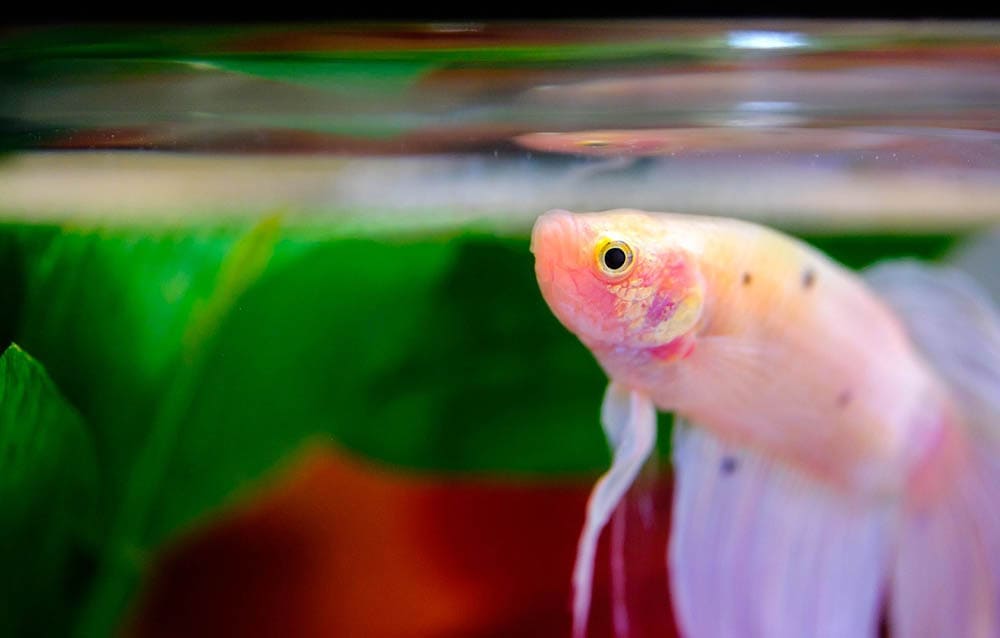
Best Ways to Treat Constipation in Your Betta Fish
The top way to treat constipation-like signs in your Betta fish is to make sure you are feeding an appropriate carnivore diet and not feeding too much or too little. Ensure your water parameters are correct and stable to rule out water quality problems causing the signs you’re seeing.
Sometimes, you’ll see people recommend aquarium or Epsom salt baths or adding these salts to the tank to help clear up constipation symptoms in fish. These treatments can be effective because they help your fish’s muscles relax, allowing stools to pass more easily. You can use this treatment if your Betta fish seems to be having difficulty pooping and you have ruled out more serious problems, like inappetence. Please note that many salts are toxic for live plants, even when dosed for therapeutic relief for fish.
The other very common recommendation that people throw around is to fast your fish. They believe that this will help prevent more backup of stool in your fish’s gastrointestinal tract, allowing your fish to pass the food it has already eaten before putting more food into the system. This can be an effective treatment if your Betta fish is having difficulty pooping due to overfeeding. Skipping a couple of meals can give the digestive tract a chance to “catch up” and not stress your fish.
The problem with fasting fish is that if your fish is having constipation-like signs because of a medical problem, then fasting it can potentially make matters worse. If you are sick, you need to eat, and the same is true for your Betta. Calories and protein give the body energy to heal and support the immune system. If you are withholding food from a fish that is not constipated but is sick, then you may do more harm than good.
How to Ensure Your Betta Fish Always Has Healthy Poop
To make sure your Betta fish always has the healthiest poop it can feed it a high-quality diet that is appropriate for a Betta. A high-quality slow-sinking pellet is a great dietary base for your Betta fish, and they can also be offered freeze-dried, thawed, frozen, or live insects like tubifex worms and brine shrimp. Betta fish do not need large amounts of plant matter to thrive (they are primarily insectivores).
Conclusion
Monitoring your Betta’s poop for appearance and regularity may sound weird, but it’s a good practice when it comes to providing excellent care to your fish. Abnormal poop can be one of the first signs of an illness, and many illnesses have the best prognosis when caught and treated early. Get used to the normal appearance of your Betta’s poop. This will help you recognize when there are changes that are indicative of a problem.
See also:
- Is Your Betta Fish is Dying of Old Age? 12 Vet-Reviewed Signs
- Betta Fish Ich: Causes, Signs, Treatment & Prevention (Vet Answer)
Featured Image Credit: Wirestock Creators, Shutterstock






